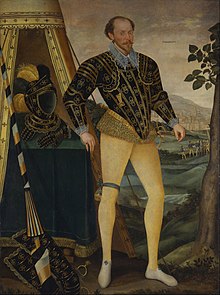William Drury (MP for Suffolk)
| Sir William Drury | |
|---|---|

Sir William Drury of Hawstead, Suffolk, 1587.
|
|
| Born | 8 March 1550 |
| Died | 1590 |
| Spouse(s) | Elizabeth Stafford |
| Children | Sir Robert Drury Charles Drury Frances Drury Elizabeth Drury Diana Drury Susanna Drury |
| Parent(s) | Robert Drury, Audrey Rich |
Sir William Drury (8 Mar 1550 – 1590) was an English landowner and member of parliament. He was the father of Sir Robert Drury, patron of the poet John Donne.
William Drury, born 8 March 1550, was the eldest son of Robert Drury (d. 7 December 1557), esquire, and Audrey Rich, the daughter of Richard Rich, 1st Baron Rich, Lord Chancellor of England. He had three brothers and eight sisters:
Drury was educated at Groton school and Caius College, Cambridge. He probably entered Lincoln's Inn in 1569. He succeeded his father, Robert, in 1557 and his grandfather, Sir William Drury, in 1558, inheriting considerable land in Suffolk, including Hawstead Place, where in 1578 he entertained Queen Elizabeth I. He was knighted around the same time.
In 1581 he was elected MP for Castle Rising, Norfolk, in a by-election caused by the illness of Edward Flowerdew. His return was challenged at the beginning of the session but confirmed by Parliament. In 1584 he was elected knight of the shire (MP) for Suffolk, sitting until 1586.
Drury was a Justice of the Peace from about 1577, and was appointed High Sheriff of Suffolk for 1582. He became an Exchequer receiver for Essex, Hertfordshire, Middlesex and London in 1587, but had to flee to the continent when owing the Exchequer £5000. By 1588, through the influence of Lord Willoughby, then in command of English forces in the Low Countries, Drury had been appointed Governor of Bergen-op-Zoom in the Netherlands, which was threatened by the Spanish. After being replaced as Governor by Thomas Morgan, a more experienced soldier, he was sent as colonel over 1000 men under Lord Willoughby to the assistance of Henry IV of France. En route he quarrelled with Sir John Borough over precedency, and a duel ensued in which Drury sustained a serious injury to his arm, losing first his hand to gangrene and then his arm by amputation. He died soon afterwards.
...
Wikipedia
